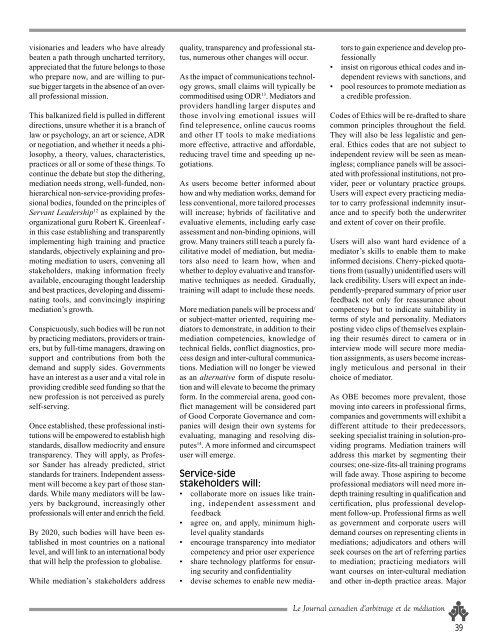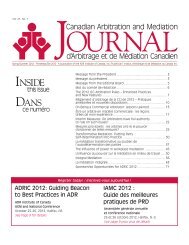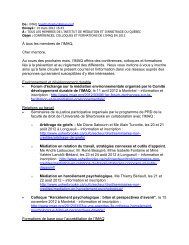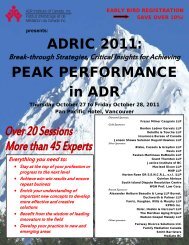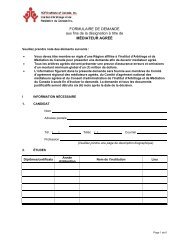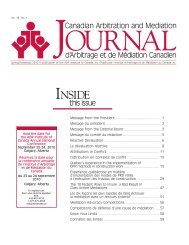Printemps 2011 - ADR Institute of Canada
Printemps 2011 - ADR Institute of Canada
Printemps 2011 - ADR Institute of Canada
Create successful ePaper yourself
Turn your PDF publications into a flip-book with our unique Google optimized e-Paper software.
visionaries and leaders who have alreadybeaten a path through uncharted territory,appreciated that the future belongs to thosewho prepare now, and are willing to pursuebigger targets in the absence <strong>of</strong> an overallpr<strong>of</strong>essional mission.This balkanized field is pulled in differentdirections, unsure whether it is a branch <strong>of</strong>law or psychology, an art or science, <strong>ADR</strong>or negotiation, and whether it needs a philosophy,a theory, values, characteristics,practices or all or some <strong>of</strong> these things. Tocontinue the debate but stop the dithering,mediation needs strong, well-funded, nonhierarchicalnon-service-providing pr<strong>of</strong>essionalbodies, founded on the principles <strong>of</strong>Servant Leadership 12 as explained by theorganizational guru Robert K. Greenleaf -in this case establishing and transparentlyimplementing high training and practicestandards, objectively explaining and promotingmediation to users, convening allstakeholders, making information freelyavailable, encouraging thought leadershipand best practices, developing and disseminatingtools, and convincingly inspiringmediation’s growth.Conspicuously, such bodies will be run notby practicing mediators, providers or trainers,but by full-time managers, drawing onsupport and contributions from both thedemand and supply sides. Governmentshave an interest as a user and a vital role inproviding credible seed funding so that thenew pr<strong>of</strong>ession is not perceived as purelyself-serving.Once established, these pr<strong>of</strong>essional institutionswill be empowered to establish highstandards, disallow mediocrity and ensuretransparency. They will apply, as Pr<strong>of</strong>essorSander has already predicted, strictstandards for trainers. Independent assessmentwill become a key part <strong>of</strong> those standards.While many mediators will be lawyersby background, increasingly otherpr<strong>of</strong>essionals will enter and enrich the field.By 2020, such bodies will have been establishedin most countries on a nationallevel, and will link to an international bodythat will help the pr<strong>of</strong>ession to globalise.While mediation’s stakeholders addressquality, transparency and pr<strong>of</strong>essional status,numerous other changes will occur.As the impact <strong>of</strong> communications technologygrows, small claims will typically becommoditised using ODR 13 . Mediators andproviders handling larger disputes andthose involving emotional issues willfind telepresence, online caucus roomsand other IT tools to make mediationsmore effective, attractive and affordable,reducing travel time and speeding up negotiations.As users become better informed abouthow and why mediation works, demand forless conventional, more tailored processeswill increase; hybrids <strong>of</strong> facilitative andevaluative elements, including early caseassessment and non-binding opinions, willgrow. Many trainers still teach a purely facilitativemodel <strong>of</strong> mediation, but mediatorsalso need to learn how, when andwhether to deploy evaluative and transformativetechniques as needed. Gradually,training will adapt to include these needs.More mediation panels will be process and/or subject-matter oriented, requiring mediatorsto demonstrate, in addition to theirmediation competencies, knowledge <strong>of</strong>technical fields, conflict diagnostics, processdesign and inter-cultural communications.Mediation will no longer be viewedas an alternative form <strong>of</strong> dispute resolutionand will elevate to become the primaryform. In the commercial arena, good conflictmanagement will be considered part<strong>of</strong> Good Corporate Governance and companieswill design their own systems forevaluating, managing and resolving disputes14 . A more informed and circumspectuser will emerge.Service-sidestakeholders will:• collaborate more on issues like training,independent assessment andfeedback• agree on, and apply, minimum highlevelquality standards• encourage transparency into mediatorcompetency and prior user experience• share technology platforms for ensuringsecurity and confidentiality• devise schemes to enable new mediatorsto gain experience and develop pr<strong>of</strong>essionally• insist on rigorous ethical codes and independentreviews with sanctions, and• pool resources to promote mediation asa credible pr<strong>of</strong>ession.Codes <strong>of</strong> Ethics will be re-drafted to sharecommon principles throughout the field.They will also be less legalistic and general.Ethics codes that are not subject toindependent review will be seen as meaningless;compliance panels will be associatedwith pr<strong>of</strong>essional institutions, not provider,peer or voluntary practice groups.Users will expect every practicing mediatorto carry pr<strong>of</strong>essional indemnity insuranceand to specify both the underwriterand extent <strong>of</strong> cover on their pr<strong>of</strong>ile.Users will also want hard evidence <strong>of</strong> amediator’s skills to enable them to makeinformed decisions. Cherry-picked quotationsfrom (usually) unidentified users willlack credibility. Users will expect an independently-preparedsummary <strong>of</strong> prior userfeedback not only for reassurance aboutcompetency but to indicate suitability interms <strong>of</strong> style and personality. Mediatorsposting video clips <strong>of</strong> themselves explainingtheir resumés direct to camera or ininterview mode will secure more mediationassignments, as users become increasinglymeticulous and personal in theirchoice <strong>of</strong> mediator.As OBE becomes more prevalent, thosemoving into careers in pr<strong>of</strong>essional firms,companies and governments will exhibit adifferent attitude to their predecessors,seeking specialist training in solution-providingprograms. Mediation trainers willaddress this market by segmenting theircourses; one-size-fits-all training programswill fade away. Those aspiring to becomepr<strong>of</strong>essional mediators will need more indepthtraining resulting in qualification andcertification, plus pr<strong>of</strong>essional developmentfollow-up. Pr<strong>of</strong>essional firms as wellas government and corporate users willdemand courses on representing clients inmediations; adjudicators and others willseek courses on the art <strong>of</strong> referring partiesto mediation; practicing mediators willwant courses on inter-cultural mediationand other in-depth practice areas. MajorLe Journal canadien d'arbitrage et de médiation39


